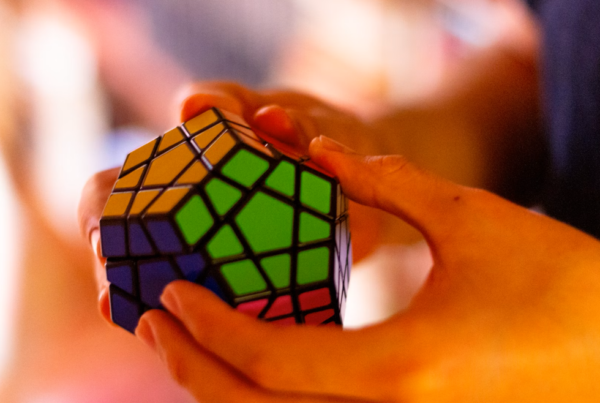


Matthijs Baas’ (Work and Organizational Psychology) question:
Dear Bastiaan,
Highly creative ideas are often rejected and ridiculed. Kodak rejected the digital camera when it was first developed in-house, and many publishers rejected J.K. Rowling’s concept for the Harry Potter series. I think many colleagues in our building (myself included) have also had similar experiences in which editors, reviewers, and grant agencies failed to see the originality and usefulness of their breakthrough ideas. Why is it that so many people are reluctant to recognize the value of creative ideas? Creativity researchers think it has to do with the difficulty in reconciling the trade-off between originality and usefulness. I was wondering what your own research has to say about this.
Matthijs
Bastiaan Rutjens’ (Social Psychology) answer:
Dear Matthijs,
Great question! I believe many different answers are possible, depending on the theoretical approach. I will try to formulate one possible answer from an intraindividual motivational perspective, then take on a broader evolutionary approach. Starting with my own interest in motivational processes (related to the need to perceive the world around us in certain ways), what we know from a large body of research is that people tend to strongly value structure and predictability in the world, even at the expense of other features of that world – such as hope. For example, on average, people would rather hear bad news (e.g. a diagnosis) than being kept in the dark about an outcome that could potentially be more hopeful. As another example, when a large-scale event takes place, such as a terrorist attack or a natural catastrophe, many people are quick to turn to conspiracy theories to make sense of the event. They do so even when the conspiracy theory implies that the world is an even gloomier place than can be inferred purely based on that event, for example attributing it to some powerful malign organization. In short, both in the case of personal experiences and large-scale societal events, research suggests that people tend to prefer the certainty of a more negative outcome over the uncertainty of a potentially more hopeful outcome. It is not hard to imagine how this strong predictability motivation might have a negative effect on acceptance of highly creative ideas. Especially when there is something at stake, many people will have the tendency to resort to the clarity of the familiar. Consequently, they will abandon the potential of an unusual and creative approach of which the outcome is shrouded in the mists of the unknown.
Your question also reminded me of a very different discipline, namely the field of cultural evolution. Theories and research in this field indicate that what sets human beings apart from other animals is not that we have culture (many species have elaborate cultures), but that we have cumulative culture. That is, our cultural knowledge is ever expanding by building on the knowledge of previous generations. Crucially, for the cumulation of cultural and technological knowledge to occur, human culture has evolved to favor over-imitation. Cultural evolution only works when role models are meticulously copied. This is why your son copies all your behaviors when you build something with Lego, even the irrelevant ones (e.g., when you pause to scratch your head before continuing building). The other ingredient needed for cumulative cultural evolution is innovation. But of that, far less is needed. First and foremost, we need high-fidelity imitation. By adding some rare instances of innovation to the mix, we facilitate progress in cultural knowledge. In short, cultural evolutionary processes need some creativity but not too much. Incidentally, cultural evolutionary pressures might restrain us from valuing too many creative ideas at once.
Bastiaan
Bastiaan Rutjens’ question is for Annemie Ploeger (Developmental Psychology):
Dear Annemie,
I recently noticed an interesting behavior that my 16-months old daughter displays on a regular basis. She appears not yet ready to share toys, stuffed animals, etc. in joint play with others. If I’m not mistaken, this is normal behavior for children of her age. At daycare, she can be seen sitting next to her peers and playing, but they all play with their own toys. But, she does share one thing in particular, and that is food. When she is eating something, she regularly wants to share the meal with us. What causes this behavior? She obviously can’t infer that we are hungry, since her theory of mind hasn’t been developed yet. Is she perhaps imitating our behavior of feeding her?
Bastiaan

Matthijs Baas’ (Work and Organizational Psychology) question:
Dear Bastiaan,
Highly creative ideas are often rejected and ridiculed. Kodak rejected the digital camera when it was first developed in-house, and many publishers rejected J.K. Rowling’s concept for the Harry Potter series. I think many colleagues in our building (myself included) have also had similar experiences in which editors, reviewers, and grant agencies failed to see the originality and usefulness of their breakthrough ideas. Why is it that so many people are reluctant to recognize the value of creative ideas? Creativity researchers think it has to do with the difficulty in reconciling the trade-off between originality and usefulness. I was wondering what your own research has to say about this.
Matthijs

Bastiaan Rutjens’ (Social Psychology) answer:
Dear Matthijs,
Great question! I believe many different answers are possible, depending on the theoretical approach. I will try to formulate one possible answer from an intraindividual motivational perspective, then take on a broader evolutionary approach. Starting with my own interest in motivational processes (related to the need to perceive the world around us in certain ways), what we know from a large body of research is that people tend to strongly value structure and predictability in the world, even at the expense of other features of that world – such as hope. For example, on average, people would rather hear bad news (e.g. a diagnosis) than being kept in the dark about an outcome that could potentially be more hopeful. As another example, when a large-scale event takes place, such as a terrorist attack or a natural catastrophe, many people are quick to turn to conspiracy theories to make sense of the event. They do so even when the conspiracy theory implies that the world is an even gloomier place than can be inferred purely based on that event, for example attributing it to some powerful malign organization. In short, both in the case of personal experiences and large-scale societal events, research suggests that people tend to prefer the certainty of a more negative outcome over the uncertainty of a potentially more hopeful outcome. It is not hard to imagine how this strong predictability motivation might have a negative effect on acceptance of highly creative ideas. Especially when there is something at stake, many people will have the tendency to resort to the clarity of the familiar. Consequently, they will abandon the potential of an unusual and creative approach of which the outcome is shrouded in the mists of the unknown.
Your question also reminded me of a very different discipline, namely the field of cultural evolution. Theories and research in this field indicate that what sets human beings apart from other animals is not that we have culture (many species have elaborate cultures), but that we have cumulative culture. That is, our cultural knowledge is ever expanding by building on the knowledge of previous generations. Crucially, for the cumulation of cultural and technological knowledge to occur, human culture has evolved to favor over-imitation. Cultural evolution only works when role models are meticulously copied. This is why your son copies all your behaviors when you build something with Lego, even the irrelevant ones (e.g., when you pause to scratch your head before continuing building). The other ingredient needed for cumulative cultural evolution is innovation. But of that, far less is needed. First and foremost, we need high-fidelity imitation. By adding some rare instances of innovation to the mix, we facilitate progress in cultural knowledge. In short, cultural evolutionary processes need some creativity but not too much. Incidentally, cultural evolutionary pressures might restrain us from valuing too many creative ideas at once.
Bastiaan
Bastiaan Rutjens’ question is for Annemie Ploeger (Developmental Psychology):
Dear Annemie,
I recently noticed an interesting behavior that my 16-months old daughter displays on a regular basis. She appears not yet ready to share toys, stuffed animals, etc. in joint play with others. If I’m not mistaken, this is normal behavior for children of her age. At daycare, she can be seen sitting next to her peers and playing, but they all play with their own toys. But, she does share one thing in particular, and that is food. When she is eating something, she regularly wants to share the meal with us. What causes this behavior? She obviously can’t infer that we are hungry, since her theory of mind hasn’t been developed yet. Is she perhaps imitating our behavior of feeding her?
Bastiaan


